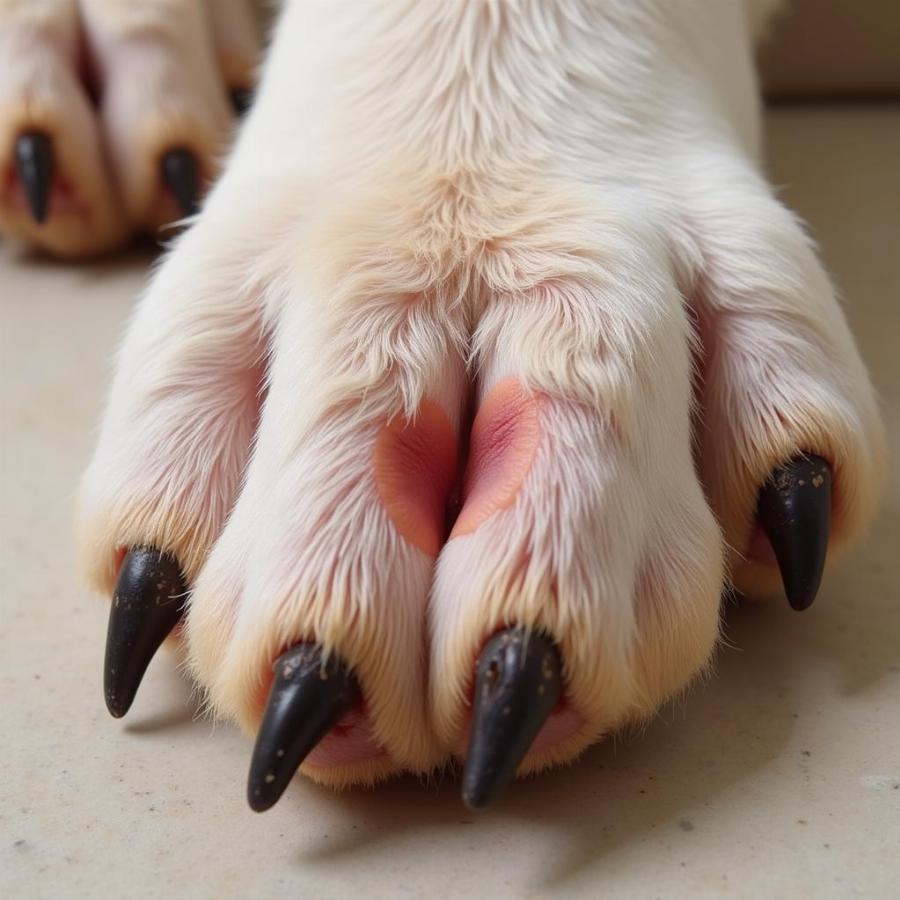Bacitracin ointment is a common over-the-counter antibiotic used to treat minor bacterial skin infections in humans. But can you use bacitracin ointment on dogs? The answer isn’t a simple yes or no. While bacitracin is generally safe for dogs in small amounts, it’s crucial to understand the proper usage, potential risks, and when to seek veterinary advice. This article will delve into the details of using bacitracin on your furry friend, ensuring you have the knowledge to make informed decisions about their health.
Understanding Bacitracin and Its Use in Dogs
Bacitracin is a topical antibiotic that works by preventing bacteria from building cell walls, thus stopping their growth and spread. It’s effective against a range of bacteria commonly found on the skin. While generally safe, using bacitracin ointment on dogs requires careful consideration. It’s essential to use it only for minor skin wounds and avoid internal use. Never apply it to deep puncture wounds, bites, or areas with significant tissue damage.
 Dog with a minor skin wound
Dog with a minor skin wound
When is Bacitracin Appropriate for Dogs?
Bacitracin can be helpful for superficial scrapes, cuts, and hot spots in dogs. It can help prevent bacterial infection in these minor wounds and promote healing. For example, if your dog has a small scratch from roughhousing with another dog, applying a thin layer of bacitracin can help protect the wound. However, if the wound is deep or appears infected, consult your vet immediately.
Potential Risks and Side Effects of Bacitracin in Dogs
While generally safe, some dogs may experience an allergic reaction to bacitracin, which can manifest as redness, itching, or swelling around the application site. If you notice any of these signs, discontinue use and contact your veterinarian. Another potential risk is ingestion. Dogs often lick their wounds, and while small amounts of bacitracin are generally not toxic, large amounts can cause gastrointestinal upset like vomiting or diarrhea.
How to Apply Bacitracin Ointment to Your Dog
If your vet approves the use of bacitracin, clean the affected area with mild soap and water, pat it dry, and apply a thin layer of the ointment. You can then cover the wound with a clean bandage to prevent your dog from licking it. Remember to monitor the wound regularly for any signs of infection or allergic reaction.
When to Consult a Veterinarian
While bacitracin can be a useful tool for minor wounds, it’s crucial to know when to seek professional help. If the wound is deep, bleeding profusely, has a foul odor, or shows signs of infection (like pus, swelling, or increasing redness), consult your vet immediately. Deep wounds may require stitches or more aggressive treatment.
Alternatives to Bacitracin for Dogs
Several alternatives to bacitracin are available for dogs, including other topical antibiotics and natural remedies. Always consult your vet before using any new medication or treatment on your dog. They can recommend the best option based on your dog’s specific needs.
Can I Use Human Bacitracin on My Dog? What About Triple Antibiotic Ointment?
While plain bacitracin is generally safe, avoid using triple antibiotic ointments containing neomycin or polymyxin B, as these can be toxic to dogs if ingested. Always opt for plain bacitracin ointment and consult your veterinarian before application.
What Should I Do If My Dog Ingests Bacitracin?
If your dog ingests a significant amount of bacitracin, contact your veterinarian or an animal poison control center immediately. While small amounts are usually not harmful, large ingestions can cause gastrointestinal upset.
Conclusion
Bacitracin ointment can be a helpful tool for treating minor skin wounds in dogs, but it should be used with caution and under the guidance of a veterinarian. Always consult your vet before using bacitracin on your dog, especially if the wound is deep, infected, or if your dog has any known allergies. Proper wound care and timely veterinary attention are crucial for your dog’s health and well-being.
FAQs
- Can I use expired bacitracin on my dog? No, it’s best to avoid using expired medications.
- How often should I apply bacitracin to my dog’s wound? Follow your veterinarian’s instructions.
- Can I use bacitracin on my dog’s eyes? No, bacitracin is not intended for use in the eyes.
- What if my dog licks the bacitracin off? While small amounts are generally not toxic, monitor your dog for any signs of gastrointestinal upset.
- Can I use bacitracin on my puppy? Consult your vet before using bacitracin on a puppy.
- Are there any home remedies I can use instead of bacitracin? Consult your vet for safe and effective home remedies.
- My dog has a deep wound. Can I use bacitracin? No, deep wounds require veterinary attention.
Other relevant articles on Beaut Dogs:
Beaut Dogs is your trusted source for expert advice and comprehensive information on all aspects of dog ownership, from breed selection to specialized care. We are passionate about providing reliable resources to help you navigate the wonderful world of canine companionship. When you need support, please contact Email: [email protected] for detailed and accurate answers from Beaut Dogs. Visit https://beautdogs.com today!